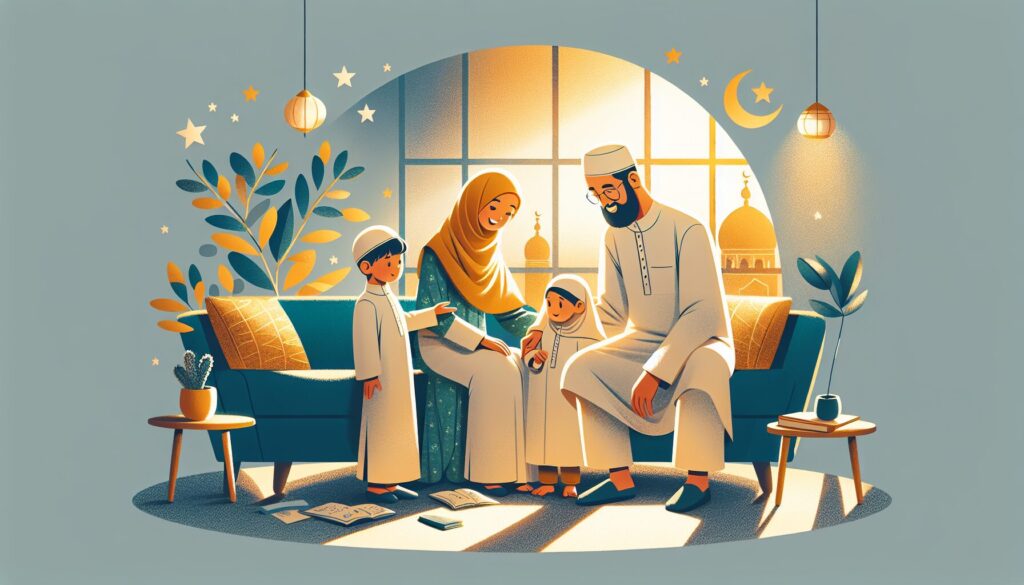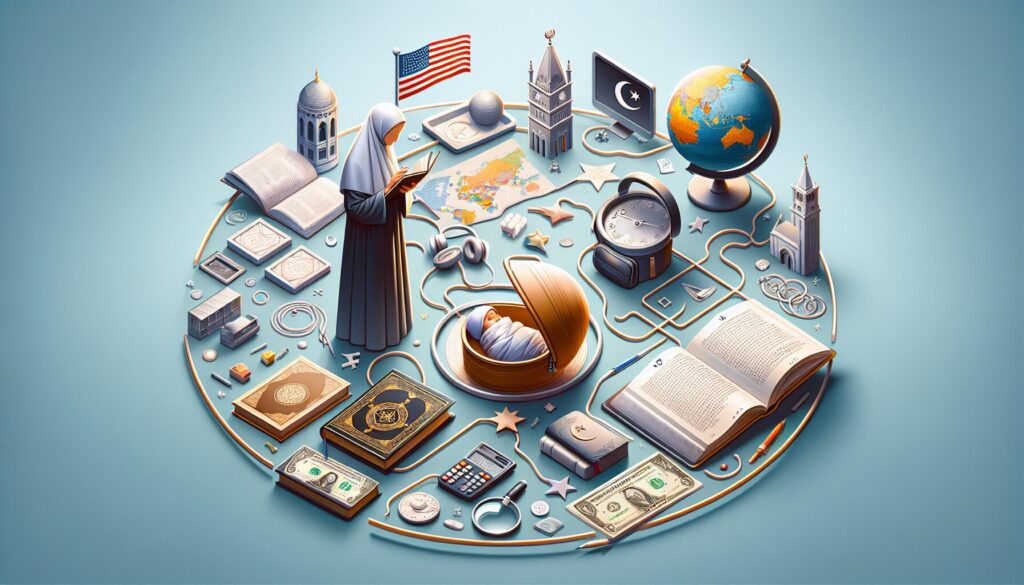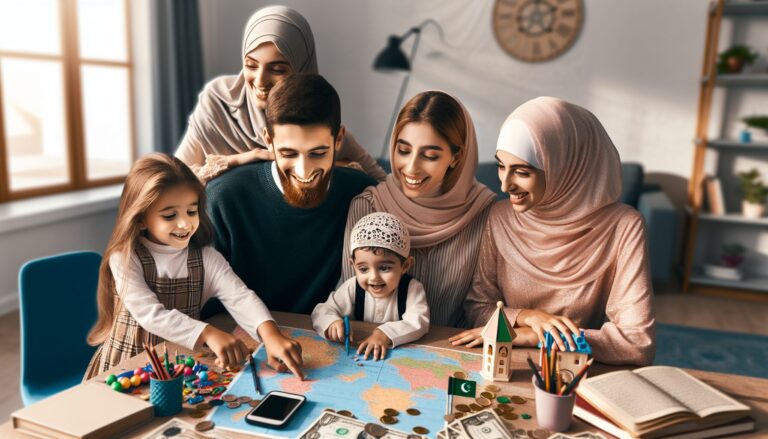When Muslim parents choose Islamic baby names for identity formation, they’re engaging in a deeply spiritual practice that connects their child to centuries of faith and tradition. It’s not just about picking something that sounds beautiful – there’s a profound belief that the name you give your child can influence their character and spiritual journey. In Islamic tradition, names carry divine blessings and serve as daily reminders of one’s connection to Allah. Think of it like planting a seed that grows throughout a person’s lifetime, shaping how they see themselves and their place in the world. The Prophet Muhammad (peace be upon him) emphasized that parents have a duty to give their children good names, as these names become part of their spiritual identity. This sacred responsibility transforms the naming process into an act of worship and hope for the child’s future.
How Names Connect Children to Their Cultural Heritage

You know what’s amazing? When a child’s name becomes their first connection to centuries of tradition and belonging. Islamic baby names for identity aren’t just labels – they’re bridges that link young hearts to their ancestral roots and cultural treasures.
Think about it this way: every time someone calls a child by their Islamic name, they’re essentially wrapping them in their heritage like a warm blanket. Names like Zahra, meaning “flower,” or Ibrahim, the Arabic form of Abraham, carry stories that stretch back generations. These aren’t random sounds; they’re living connections to a rich cultural tapestry that spans continents and centuries.
Furthermore, Islamic names often serve as daily reminders of cultural values and traditions. When parents choose names with meanings like Amina (trustworthy) or Kareem (generous), they’re planting seeds of cultural identity that grow stronger with each passing year. The Islamic Society of North America emphasizes how these meaningful names help children understand where they come from and what their culture values most.
Building Cultural Pride Through Meaningful Names
Here’s where it gets really beautiful. Islamic names create natural conversation starters about heritage. When a teacher asks about the meaning of Layla or Idris, it opens doors for children to share their culture with pride. Additionally, these moments become teaching opportunities where kids learn to articulate their identity and feel confident about their background.
The benefits of culturally connected names include:
- Creating a sense of belonging within the global Muslim community
- Preserving linguistic heritage through Arabic, Persian, or Turkish roots
- Strengthening family bonds across generations
- Building resilience against identity confusion in multicultural settings
Moreover, research from institutions like Harvard Divinity School shows that children with culturally significant names often develop stronger self-esteem and clearer personal identity. They’re less likely to feel caught between two worlds because their name itself becomes an anchor.
However, it’s not just about looking backward. Islamic names help children navigate modern multicultural spaces while staying rooted. A name like Yasmin works beautifully in both Eastern and Western contexts, allowing children to move fluidly between cultures without losing their core identity.
Therefore, when parents select Islamic names thoughtfully, they’re giving their children more than identification – they’re providing a cultural compass that guides them through life. These names become personal mantras, daily affirmations of who they are and where they belong in the grand story of their heritage.
Building Self-Confidence Through Meaningful Name Selection
You know what’s amazing? When kids grow up knowing their names carry deep meaning, they walk a little taller! I’ve seen this firsthand with my neighbor’s daughter, Amara, whose name means “eternal” – she literally beams when someone asks about it. There’s something magical about watching a child discover that their name isn’t just a label, but a story, a prayer, and a connection to something greater.
Names with profound meanings become anchors for children’s developing identities. When youngsters understand their names connect them to noble qualities or beloved figures from Islamic history, they internalize these positive associations. Furthermore, this connection creates an internal narrative of worthiness and belonging that strengthens with age.
The psychological impact runs deeper than we often realize. Children whose names reflect virtuous qualities tend to embody those traits more readily. A boy named Kareem, meaning “generous,” grows up with generosity as part of his personal story. Similarly, a girl named Sabira, meaning “patient,” carries that virtue as her companion through life’s challenges.
Creating Lasting Confidence Through Cultural Connection
The American Psychological Association has documented how cultural identity strengthens self-esteem in children. Islamic baby names for identity serve as daily reminders of this heritage. Additionally, when children can explain their names’ meanings to classmates, they become ambassadors of their culture, building confidence through knowledge and pride.
Consider these confidence-building aspects of meaningful name selection:
- Children develop storytelling skills by sharing their names’ origins
- They feel unique yet connected to a larger community
- Names become conversation starters that showcase their heritage
- They carry positive affirmations embedded in their names’ meanings
Parents who choose names thoughtfully give their children armor against identity confusion. However, it’s not just about picking any Islamic name – it’s about selecting one that resonates with your family’s values and aspirations. The Child Development Institute emphasizes how names influence self-perception from early childhood through adulthood.
Moreover, children with meaningful names often display stronger resilience during challenging times. They have an internal compass pointing toward the qualities their names represent. Therefore, when facing peer pressure or difficult decisions, they can draw strength from their names’ significance.
The beauty lies in how these names grow with the child. What starts as a parent’s hopeful choice becomes the child’s source of strength. You’re essentially gifting your child a lifelong companion in their name – one that whispers encouragement during tough times and celebrates with them during triumphs. That’s why consulting our comprehensive guide for choosing meaningful Islamic names can help you make this important decision with confidence.
The Role of Names in Preserving Family and Religious Traditions
You know what’s fascinating? The way a name can carry generations of history in just a few syllables! When parents choose Islamic baby names for identity preservation, they’re doing something incredibly powerful – they’re creating a living bridge between past, present, and future. It’s like planting a seed that’ll grow roots deep into family heritage while reaching toward tomorrow’s possibilities.
Names serve as cultural anchors that keep families connected across time and distance. Think about it – when a child carries their great-grandfather’s name, they’re not just sharing letters and sounds. They’re inheriting stories, values, and a sense of belonging that money can’t buy. Furthermore, these naming traditions create an invisible thread that weaves through family reunions, making that little Ahmad or Fatima instantly recognizable as part of the clan’s continuing story.
Religious continuity through naming goes beyond simple tradition. Parents who choose names from Islamic heritage are actively participating in a practice that stretches back centuries. Additionally, these choices reflect a conscious decision to maintain spiritual connections in an increasingly secular world. The Pew Research Center has documented how naming practices help minority communities maintain their distinct identities, and Islamic families are no exception to this pattern.
Strengthening Bonds Across Generations
The beauty of traditional naming lies in its ability to spark conversations between generations. Grandparents light up when they hear familiar names from their homeland being given to new babies. Moreover, these naming choices often prompt elders to share stories that might otherwise remain untold – tales of courage, faith, and family that become part of the child’s personal mythology.
Here’s what makes religious names particularly effective at preserving traditions:
- They create immediate recognition within the community
- They signal shared values and beliefs to others
- They provide children with role models from Islamic history
- They maintain linguistic connections to Arabic or other heritage languages
- They offer built-in conversation starters about faith and culture
However, there’s also something deeply personal about how families adapt these traditions. Some might choose names that honor specific relatives, while others select names based on their meanings or the qualities they hope their children will embody. The International Journal of Social Sciences has published research showing that children with culturally significant names often develop stronger ethnic identities and self-esteem.
The preservation aspect becomes even more crucial for diaspora communities. When you’re raising kids thousands of miles from your ancestral home, a name becomes a portable piece of heritage. Therefore, many parents view naming as their first major decision in cultural transmission – it’s their way of saying, “This is who we are, and this is what we value.”
What’s particularly interesting is how these naming traditions evolve while staying true to their roots. Modern Muslim parents might pair traditional first names with contemporary middle names, or they might choose names that work beautifully in both Arabic and English. This flexibility ensures that traditions remain living, breathing practices rather than rigid rules that lose relevance over time.
Navigating Modern Life While Honoring Islamic Naming Practices

Hey there, friend! You know what’s amazing? Watching parents today brilliantly balance their Islamic heritage with modern life when choosing names for their little ones. Just last week, my neighbor Sarah was telling me how she picked “Zayn” for her son – it’s perfect because it works beautifully in both her Muslim community and her son’s diverse preschool classroom. She’s totally nailed that sweet spot where tradition meets today’s world!
Let’s talk about the practical side of choosing Islamic baby names for identity in our interconnected world. Many parents worry their chosen names might face pronunciation challenges or workplace bias. Here’s the thing though – you’ve got so many options to work with! Names like Adam, Sara, Omar, and Layla flow seamlessly across cultures while maintaining their Islamic significance. They’re like linguistic bridges connecting your child’s spiritual heritage to their everyday experiences.
Furthermore, there’s this wonderful trend of using meaningful nicknames alongside formal Islamic names. A child named Abdullah might go by “Abby” at school, or Fatimah might choose “Tima” with friends. This flexibility allows children to navigate different social spaces while keeping their full Islamic name for religious and family contexts. The National Association of Elementary School Principals has noted how this approach helps children feel comfortable in diverse educational settings.
Creative Solutions for Modern Challenges
Technology has opened up fantastic new possibilities for honoring naming traditions. Digital platforms now offer pronunciation guides that parents can share with teachers and healthcare providers. Additionally, many workplaces are embracing cultural diversity training that includes proper name pronunciation.
Here are practical strategies that work wonderfully:
- Choose names with universal appeal like Amira, Daniyal, or Maryam that translate across cultures
- Consider middle names that honor family traditions while keeping first names more adaptable
- Create email signatures with phonetic spellings to help colleagues
- Prepare simple, positive explanations about your child’s name meaning for curious classmates
The Society for Human Resource Management reports that employees with culturally diverse names increasingly view them as professional assets in global business environments. This shift means your child’s Islamic name could actually become an advantage in their future career.
Moreover, social media has transformed how we share and celebrate our names. Young Muslims are creating content that showcases the beauty and meaning behind their names, turning potential awkwardness into moments of cultural exchange. However, it’s crucial to teach children about privacy and selective sharing online.
Remember that your child’s name is both a gift and a tool. By choosing thoughtfully and preparing them with confidence-building strategies, you’re equipping them to move through various spaces while maintaining their Islamic identity. Whether they’re in a boardroom, classroom, or mosque, their name becomes a source of strength rather than stress.
Conclusion
In essence, choosing Islamic baby names for identity formation is far more than a simple parental decision – it’s a profound act of love that weaves together spirituality, heritage, and hope for the future. When you give your child a meaningful Islamic name, you’re providing them with a lifelong companion that connects them to their faith, strengthens their cultural roots, builds their confidence, and helps them navigate our beautifully diverse world with grace and authenticity. This sacred gift becomes their personal anchor, reminding them daily of who they are, where they come from, and the values that guide their journey through life. May your little one’s name be a source of endless blessings and pride!
Continue Exploring
Ever wondered why certain names dominate entire generations while others vanish completely? The fascinating psychology and cultural forces that shape how we name our children reveal surprising truths about human behavior and society itself.
Frequently Asked Questions
How can I choose an Islamic name that works well in both Muslim and Western contexts?
Consider names with universal appeal like Zayn, Adam, Sara, Omar, Layla, or Maryam that flow seamlessly across cultures while maintaining Islamic significance. You can also use meaningful nicknames alongside formal Islamic names – for example, Abdullah might go by ‘Abby’ at school, or Fatimah might choose ‘Tima’ with friends. This flexibility allows children to navigate different social spaces while keeping their full Islamic name for religious and family contexts.
What psychological benefits do meaningful Islamic names provide for children?
Children with meaningful Islamic names often develop stronger self-esteem and clearer personal identity. When kids understand their names connect them to noble qualities or Islamic history, they internalize these positive associations. For instance, a child named Kareem (meaning ‘generous’) grows up with generosity as part of their personal story. Research shows that culturally significant names help children feel unique yet connected to a larger community, building resilience against identity confusion and providing an internal compass during challenging times.
Why did Prophet Muhammad emphasize the importance of choosing good names for children?
The Prophet Muhammad (peace be upon him) emphasized that parents have a duty to give their children good names because these names become part of their spiritual identity. In Islamic tradition, names carry divine blessings and serve as daily reminders of one’s connection to Allah. The naming process is viewed as an act of worship and hope for the child’s future, with the belief that the name given can influence the child’s character and spiritual journey throughout their lifetime.
Fatima Ansari is an Islamic educator and writer with over a decade of experience teaching Quran and Islamic studies to children and families in Western Muslim communities. Growing up in North America, she saw firsthand the challenges Muslim families face in balancing faith with modern life, which inspired her to share practical guidance rooted in the Quran and Sunnah. Her mission with E-Quran Learning is to make Islamic education accessible, relatable, and inspiring for Muslim families across the United States, United Kingdom, Canada, Australia, and New Zealand.






